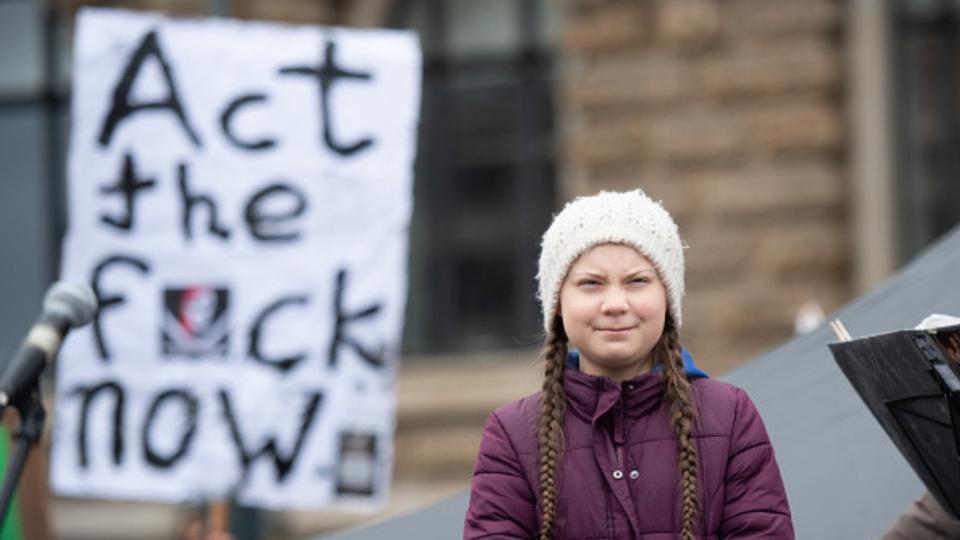Support Greta’s call for a global climate strike

The inspiring, global student-led climate strike protests on May 24, initiated by high school students, took place in an incredible 1594 cities and towns across more than 118 countries.
It shows the global student strike movement is growing, out-mobilising strike actions just two months before and joining up with other climate networks such as Extinction Rebellion.
The #FridaysfortheFuture protests, started by Swedish school student Greta Thunberg, were also organised in several cities in Australia on May 24, the largest of which was called by Extinction Rebellion in Melbourne. Thousands of students and others joined in a mass civil disobedience action in the CBD.
The protests in Australia were fuelled by the re-election of the climate-denying, coal-loving federal Coalition government.
Thunberg and 46 other youth activists, who were part of initiating the first school strikes for climate, have now issued a call for a general strike as part of a week of action, starting September 20.
They have also made a pitch to adults to join in the strikes, saying young people cannot force real action on climate on their own.
“To change everything, we need everyone,” Thunberg said. “It is time for all of us to unleash mass resistance — we have shown that collective action does work. We need to escalate the pressure to make sure that change happens, and we must escalate together.”
The strike date is just before a crucial United Nations summit on the Paris Agreement, at which countries will be urged to take a stronger stand on reducing carbon emissions.
Thunberg and her cohort’s strike call is the type of mass action that is critical if we are going to push back the powerful fossil fuel corporations and their parties in government.
There is a lot of work to be done, though, in the next four months to build the sort of alliances that will be necessary to persuade unions and community networks to support Thunberg’s general strike call.
Encouragingly, the School Strike 4 Climate movement in Australia has begun calling for and organising September 20 protests in all major cities. Their aim is to mobilise even larger numbers than the massive March 15 school strike, which should be easy given the federal government’s push to get the Adani and other coal mines up and running.
The student climate movement’s focus on continuous mass mobilisations as a critical part of its political strategy to force real action is an encouraging development.
For too long, the climate movement has struggled to find a common focus and the leaderships of many environmental organisations have little confidence in mass mobilisations, preferring instead to concentrate on lobbying politicians and only asking their supporters to get active at election time.
The students’ focus on generating street heat, at regular intervals, means that a lot more people can join in and take direct action. They are also provoking responses.
Following the March 20 school strikes, which helped trigger the Extinction Rebellion protests that shut down parts of London in April, the governments of Britain and Ireland subsequently declared a Climate Emergency.
Extinction Rebellion was first established in Britain last year and organised a huge action in London on April 15. It aims to build non-violent resistance and is drawing in both students and non-students.
It organised the May 24 rallies in Melbourne and Sydney and, two days later, staged an occupation in the Queensland Museum in Brisbane.
Extinction Rebellion wants zero greenhouse gas emissions by 2025. It has called for “Citizens’ Assemblies” to talk about how to make this happen and to get more people involved in the movement.
In Melbourne, an Extinction Rebellion organising meeting attracted more than 100 people, including people who are new to activism.
Socialist Alliance supports the student-led climate movement and Extinction Rebellion and all those who want to work together to boost the numbers for the next global strike. We need to look for all opportunities to link up with trade unions, community and faith groups to make the September strike so big the Scott Morrison government cannot ignore it.
With just 12 years to stop global warming, this is the only way we can take on the enormous power of the fossil fuel industry and its fossilised government.
[Jacob Andrewartha is a member of the Socialist Alliance national executive and a Melbourne organiser.]